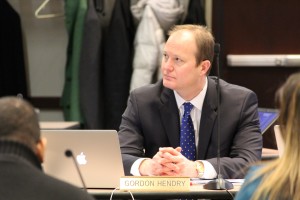Searching for Solutions to Indiana’s Teacher Shortage Problem
By now, you’ve likely heard this headline: Indiana – like many other states all over the country – is facing a teacher shortage.
As we’ve reported, the number of first-year educators granted a Hoosier State license dropped pretty dramatically last year. Across the nation, fewer people are becoming teachers than in past years, too. Enrollment in teacher preparation programs in the U.S. fell by about 30 percent between 2010 and 2014.
For the most part, people agree this drop could represent a troubling trend. Where they tend to disagree is in what’s causing it, and what the appropriate response should be.
Everyone, even the national media, has an opinion. Long story short: officials mulling over what to do about Indiana’s situation usually lie in one of two camps.
- Finding the FixBy now you’ve likely heard this headline: Indiana – like many other states across the country – is facing a teacher shortage.. The number of first-year educators granted a state license dropped by 25 percent last year. For the most part, people agree this drop could represent a troubling trend. Where they tend to disagree is in what part of a teacher’s career they want to employ a solution. StateImpact Indiana’s Rachel Morello explains…Download
Camp No. 1: Provide Incentive
On one side, there are those who see the shortage as a problem that can be addressed most effectively on the front end, when teachers first enter school as students. They see it as a matter of what teaching trainees pay for their education versus the return on that investment once they get a job.

Gordon Hendry listens during a State Board of Education meeting earlier this spring. (Photo Credit: Rachel Morello/StateImpact Indiana)
Indiana State Board of Education member Gordon Hendry sits on this side of the issue. He says he thinks he has a solution that will get more of the state’s best and brightest into Hoosier classrooms: do something about their low salaries.
“There’s been a substantial rise in the cost of getting a higher education in our state. When you weigh that against the teacher salaries, I think the formula is a little out of whack,” Hendry says.
Hendry’s Next Generation Hoosier Educator Scholarship program would afford top Indiana high school students the opportunity to earn a full ride to any accredited in-state school of education.
The catch? Afterward, they’d have to spend at least four years teaching in an Indiana classroom. Hendry calls it “four years for four years,” and says he thinks it’s a fair tradeoff.
“I don’t view this as indentured servitude,” Hendry explains. “My proposal encourages them to stay in the classroom for four years, and by then, hopefully, they’ve gotten their classroom ‘sea legs’ and are in a better position to decide to stay in the profession for a few more years, or maybe even their entire career.”
Indiana political commentator Abdul Hakim-Shabazz writes in the Indianapolis Star that the methods by which college students can become teachers nowadays might also be contributing to the problem – and some solutions for that symptom already exist:
In the old days you got an education degree with a minor in a subject area such as science or history. Now, for secondary education, you get the degree in the subject area with a minor in education. But once students earn degrees in their areas of major, many of them stay in that field rather than pursuing a career in education […]
Luckily, ideas have emerged on how to address this problem. The state already has a program, although it’s not taken advantage of often enough, that allows individuals in other professions to transfer into teaching if they meet certain criteria. Programs such as Teach for America recruit highly talented graduates in other fields to devote a few years to teaching. The Mind Trust also is working to develop new teaching talent.
Camp No. 2: Fix What’s Broken
In the other camp, there are those who see the teacher shortage as a problem on the back end: what teachers experience once they enter a classroom of their own.
Keith Barton, associate dean for teacher education at Indiana University’s School of Education, is on this side. He says the teacher shortage stems from policies that are making it harder for teachers to do and enjoy their jobs.
“I think policymakers are going to have to really understand what it is that’s keeping teachers out of the field,” Barton says. “Turning back the factors that have driven teachers away is the only way to increase the supply again.”
Like many others who take this side, Barton cites an increase in the amount of testing that students are subjected to, in addition to a bigger emphasis on accountability measures for teachers.
—Keith Barton, Associate Dean for Teacher Education, IU School of Education
“I think that many teachers feel like instead of really being professional decision-makers they have just become people who prepare students for tests,” Barton explains.
A lot of the people who take this stance are teachers. They’ve seen their numbers slowly dwindling, seen fewer and fewer members added to their ranks as time passes, and may have even considered leaving the profession themselves. And, like Barton, they say something has to change about the conditions under which teachers work.
“The job of teaching is going to have to become better,” Barton says. “People are not going to be so easily fooled that just the offer of some incentive is going to convince them to spend four years studying for a career that’s not going to be a good one.”
It’s Complicated
This issue is not so simple as black and white. What makes it so complicated is that each side tends to see the other’s point.

The number of first-year educators granted a Hoosier state license dropped dramatically last year, according to Department of Education data. (Photo Credit: Sofia/Flickr)
Hendry says he’s aware his proposal is not the silver bullet, and that he recognizes there’s a need for a larger discussion about teacher retention.
“Although it’s something that some folks play up a little bit more than I think it deserves, there are concerns that have been expressed by teachers in our state about the respect they’ve been given,” Hendry says. “I know that we’re in somewhat of a period of change in Indiana’s education system, and I think most of that is good, but there are some things that we need to continue to improve.
Barton says he recognizes that it’s the combination of lower salaries and increasing control over teachers’ work that has made it a much less attractive job. And he adds no matter who’s right, the message both sides are sending to potential teacher candidates is the same.
“On the one hand, you get people saying that teachers are the problem and they have to be held more accountable – on the other side you have people saying teachers are wonderful but now their jobs are terrible,” Barton summarizes. “Regardless of what people’s perspective are, young people are really getting exposed to this message of teaching is no longer a good job.”
National experts see the duality of the issue, too. Here’s Chad Aldeman, an associate partner with Bellwether Education Partners and former policy advisor at the U.S. Department of Education, on a recent episode of The Diane Rehm Show:
Aldeman: A big part of it is cyclicality and there’s a big study out recently looking at the college major choices of 20-year-olds and what they choose…And they estimated that teachers and education was one of the most cyclical majors and that for every one percentage point increase in the unemployment rate…about 6 percent fewer college 20-year-olds, sophomores, were likely to go into education […]
Rehm: Now, does that have anything to do with, say, Common Core or teacher evaluations or teacher’s not being treated well or, indeed, salaries?
Aldeman: I think there’s something to do with all those things, but it’s hard to pin down what exactly those are. I think a much more simple explanation is that the economy is driving a lot of this.
What Can Be Done?
Where do the policymakers come down on this?
In general, they’re not sure yet. Most say they need more information.
Indiana Commissioner for Higher Education Teresa Lubbers says she wants to learn more about exactly which subsets of classrooms the shortages are affecting and why people aren’t going into those areas.
“If you have a science, technology, engineering or math degree, think of all the opportunities you have in the workforce,” Lubbers gives as an example. “What would [motivate] you to go into, and then stay in education?”
“Is it a subject matter issue? Is it a pay issue? I think all of those we’re going to have to consider before we jump to conclusions about policies,” Lubbers says.
Rep. Bob Behning, R-Indianapolis, heads a legislative study committee that will dive deeper into the shortage this fall. He says he hears a lot about school reforms being part of the problem – but he’s more inclined to look at trends, like Commissioner Lubbers suggests.
“Having some accountability measures and standardized testing cannot be the only problem,” Behning says. “I think we need to be looking at ways to encourage potential educators going into areas of need, as opposed to going into areas where they may find it more difficult to find employment.”
Behning says realistically, he could see the legislature approving some sort of incentive-based program, similar to the kind Hendry is proposing. But, he says he wants to look at all potential solutions.
He’ll have his first chance to do that when the interim study committee on education meets to discuss teacher shortage data on Sept. 19.
Podcast: Play in new window | Download